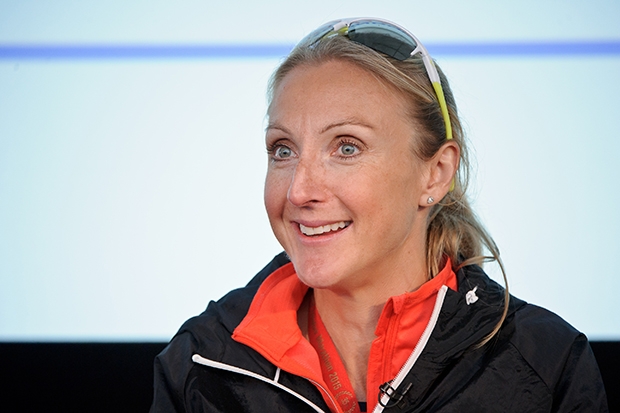Do you want to see Paula Radcliffe’s blood? If so, you’re not alone. Radcliffe, three-time winner of the London Marathon has been outed as a drugs cheat by the Tory MP Jesse Norman. No proof, but proof is for wimps. Radcliffe’s name will now always have a certain stink.
Norman used parliamentary privilege to talk about ‘the winners or medallists at the London Marathon, potentially British athletes… under suspicion for very high levels of blood doping.’ That was enough to tar Radcliffe as a possible druggie. It’s like accusing a public figure of paedophilia: the softest whisper will do for them.
Pressure has been brought on Radcliffe to go public with her ‘blood values’ — complex medical data — but she has refused, on the legitimate grounds that no one bar a few experts has the slightest idea what they mean.
Radcliffe is the second major British athletics love-object to get the treatment this year. Earlier it was Mo Farah, double Olympic gold-medal winner in London in 2012. A Panorama programme claimed that his coach, Alberto Salazar, had done some dodgy stuff. Nothing that involves Farah, but the whisper is enough. Farah is now forever tainted. Both have denied any wrongdoing; fat lot of good that will do.
The problem of drugs in sport is that it’s two issues in one. The public and, by extension, the journalistic view is that either you take drugs and you’re evil, or you don’t take drugs and you’re a good guy — at least until you get caught. It’s a straightforward business, one that permits no doubt or ambiguity.
The truth is complex and difficult — and routinely avoided. Many top-level sports-people use drugs every day. They couldn’t perform without them. They often take these drugs knowing that their use could compromise their future health. These drugs are not only legal, but those who take them are more likely to be praised than blamed. ‘Playing through the pain.’ It’s part of sport’s mystique.
Many painkillers and anti-inflammatories are permitted in sport. The Fifa chief medical officer Dr Jiri Dvorak said half the international footballers would take painkillers before every match. You can buy ibuprofen and aspirin over the counter; you can get diclofenac and naproxen on prescription. And play sport without a problem.
You can’t do that if you’re a horse. Painkillers and anti-inflammatories are banned in the equestrian sports. Danilon — an anti-inflammatory I serve to an aged Shetland pony every other day — is illegal in competition. That’s because when under extreme stresses a horse can damage itself if unaware of pain — and it’s axiomatic that the welfare of the horse comes first. The welfare of the human athlete clearly doesn’t, as many a limping ex-pro can tell you.
When is a drug not a drug? You can take certain banned substances if you have a ‘therapeutic use exemption’: so you can have a good pull on your asthma puffer before the race. Then there are dietary supplements. These sound OK but have been known to contain banned substances. Athletes are warned not to believe any label that says ‘Safe for sports people’ or ‘Approved by Wada’, the World Anti-Doping Agency. But accidents happen in this shadowy territory that lies between nutrition and drugs.
Drugs banned in sport include anabolic steroids, certain peptide hormones, stimulants, diuretics, narcotics and beta-blockers. It’s also illegal to improve your oxygen carrying capacity by a pre-race transfusion of your own blood. Small wonder the drug testers are lagging behind the cheats. Roughly speaking, drugs that help you do it better are evil, but drugs that stop you doing it worse are fine. Unless, of course, you’re a horse.
We are prepared — eager — to make villains of those on whom the lightest finger of suspicion alights. Christine Ohuruogu, the British runner, was banned after missing three out-of-competition drugs tests. This always looked like dodgy diary-keeping rather than systematic drugs use. But it prompted an arguably racist campaign in the Sun. Referring to the forthcoming London Olympic Games, the paper said: ‘We can’t let Ohuruogu be the face of 2012.’
It’s accepted that doping is a sin far worse than mere cheating. It’s not like a false start, diving in the penalty area or not walking when you’ve edged the ball. It’s considered destructive not of the event but of the entire sport: perhaps of the whole idea of sport.
The issue of drugs in sport is a classic example of what happens when a complex matter is treated as a simple one. We now judge it by means of nursery morality, while the humanity of all those involved has got lost. It’s as irrational and as crazy as sport itself: but without any of the joy.






Comments